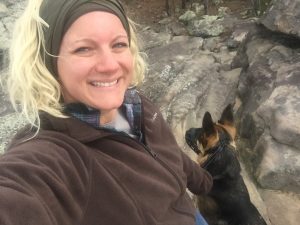
Dr. Amanda L. Glaze is Assistant Professor for Science Education at Georgia Southern University. Her position allows her to do both, applied science research and education research. She is looking for ways that academics can support and prepare the next generation of science teachers and thinkers. Teachers are the ones who have the single greatest opportunity to have an impact on public perceptions in science.
Amanda focuses on evolution education from kindergarten to 12th grade (K-12). Evolution education is noted as the greatest failing of science education in the 21st century in the USA. This is mostly because many people still find the theory of evolution to be fundamentally anti-religious, and thus “controversial”. These deeply seeded misconceptions about science are used as grounds for anti-science legislation, climate change denial, and other contentious points.
Amanda engages frequently in talks about science and religion, to share her own story of navigating conflict between her highly religious background and being a scientist in a field the public sees as very anti-religious and controversial.
During her week on @sfprocur, Amanda wants to highlight the importance of having a scientific worldview. Science is for everyone and understanding the nature of science is key to informed decision making and building a better world.
background
Amanda grew up in a very devout Southern Baptist ministry family (largest non-Catholic Christian denomination in the USA) in rural Alabama. She had a very normal Southern childhood, complete with neighborhood fish fries, dance lessons, Alabama football (Roll tide!), summers at the river, and learning to enjoy the great outdoors – as much an outdoorswoman as the proverbial Southern girl.
She had the benefit of being adopted into a family that viewed education as [S1] a foundation that could never be taken away. Amanda’s grandmother, educated with a Master’s Degree, was even recruited[S2] for special services to work with the government during WWII, and helped develop a new guidance technology. Amanda’s mother also had a Master’s degree, and worked as a counselor and teacher. She was divorced and a single mom for a portion of Amanda’s youth, and [S3] she had many others in the family encouraging Amanda from a young age.
Her family encouraged Amanda’s love of the outdoors on the family farm, and nurtured her strong curiosity and personality. Amanda alternated between spending time with the animals on her grandparent’s farms (one set had cattle, the other agriculture) and being a cheerleader, and she split her interests between dance classes and science experiments.
Amanda often relates to Ada Lovelace. Both grew up without being told they could not do something because they were women. Rather the opposite, Amanda was pushed and continually encouraged to go above and beyond expectations in all realms. The impact her grandmother and mother (both strong Southern women) had on her life was profound. Amanda has many memories of being told throughout that she could do anything. All she had to do was set her goals and make them happen.
At fourteen, Amanda was involved in a physically violent and emotionally abusive relationship that forever damaged her trust in people. At nineteen she gave birth to her first child, out-of-wedlock, in the Heart of Dixie (“no stigma on that”, she comments).
But she never lost sight of her love for science and her desire to go as far as my studies could take her. As a single mother, Amanda went back to school. There she went from a full ride leadership scholarship with honors at a liberal arts university to taking one class at a time from her hometown junior college.
While Amanda built a life for her son and herself, she pushed through her education, earning my bachelor’s degree and acceptance to a master’s program for study in science and education while also being a full-time mom (“my 17-year-old has enough lab time to be a post-doc”). She married and divorced between beginning her doctoral studies and taking her first university position. In order to keep moving forward, she juggled many different part-time jobs in addition to her studies.
Amanda had to fight at every turn to justify to department heads and lab directors that she was worth the time and space to complete her research. She had to overcome many obstacles: coming from a less lauded program, the constraints of being a single mother, majors in both education and the sciences, and being a newlywed with children. These were seen negatively, rather than as proof of her ability to persevere and thrive when challenged.
Amanda conducted her dissertation research and proposal while pregnant, and finished her dissertation writing at home with three children while her (now former) husband finished a four-month stint in Washington D.C.
Following her graduation, she taught for several years as she didn’t want to miss out on her children growing up. When her children were at a good transition age, Amanda took a position at a university as faculty.
These days she looks back and marvels at all the twists in the path to where she is now: “no matter what you face, if you keep pushing forward you can reach your goals”.
Amanda shares her life with a new partner and four children, while also balancing life as a research academic. She says that she would not want to change a thing about her path which made her a more empathetic person. And her ability to listen without judgement has become a key element in her research and outreach.
“I can truly say that my plans have changed dramatically over my short lifetime… from curious daughter, to single mom, to scientist, to wife, and then single mother again. I have worn all of these hats on my journey, and each has played a special role to get me to a point in my life where I am comfortable saying that I am both academic and domestic, conventional and revolutionary, all on my own terms. “